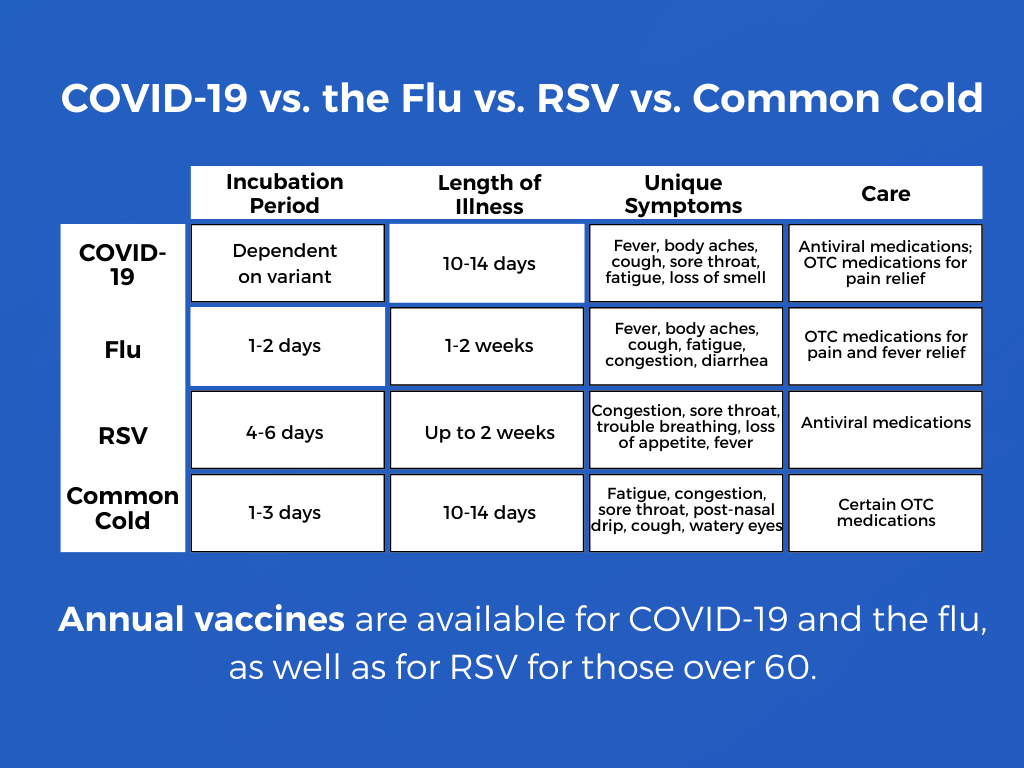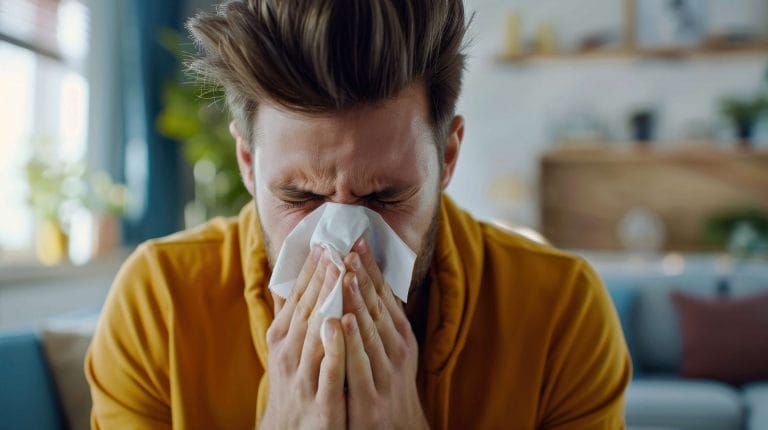
Explore Health Services Offered by PAM Health
What Are They?
COVID-19, RSV, the flu, and the common cold are all conditions caused by different viruses that affect the respiratory system and, depending upon the person, may impact other body systems, including the gastrointestinal tract.
How Soon Will I Get Sick?
All four illnesses spread through droplets from coughing and sneezing or from close personal contact. These droplets can travel through the air and land on different surfaces. If someone comes into contact with a contaminated surface and then touches their face, eyes, or mouth without washing their hands, they may become ill. While it is wise to avoid being around others who are sick, people can sometimes unsuspectingly pass along these viruses before they even realize they are ill themselves.
- COVID-19 – The incubation period for COVID-19 depends upon the variant. With the Omicron variant, which was the dominant strain of the virus in late 2022, the typical time between infection and symptoms was about 3 days.[1]
- RSV (respiratory syncytial virus) – People with RSV become sick within 4-6 days after exposure.[2]
- Flu – Flu symptoms can begin within as little as a day or two after exposure. [3]
- Common Cold – Symptoms usually start to appear between 1-3 days after exposure.[4]
How Long Does Illness Last?
How long the illness lasts depends on several factors, including a person’s age, overall health, pre-existing medical conditions, and if they received any type of treatment. In addition, the longer a person does not feel well enough to get out of bed, their illness may end up impacting their ability to function – especially for those with complex medical conditions or over the age of 65. PAM Health inpatient and outpatient rehabilitation hospitals can offer treatment plans for those individuals.
- COVID-19 – COVID-19 symptoms can continue for 10-14 days. [5]
- RSV – RSV can last up to 2 weeks.[6]
- Flu – Flu symptoms can last from 1-2 weeks.[7]
- Common Cold – The typical cold lasts from 10-14 days. Most adults get 1-2 colds a year, and children average even more.[8]
What Are Typical Symptoms?
It can be challenging to tell the difference between COVID-19, RSV, and the flu. The only definitive way to do so is to have a medical professional perform a test. For some people over the age of 65 or under the age of 5, as well as those with underlying medical conditions, RSV, the flu, and COVID-19 can cause complications, hospitalization, and even death. [9] That is why it is important to consult with a physician when someone is not feeling well to get an accurate diagnosis and treatment plan. The list below is not meant to diagnose a specific illness but lists common symptoms of each.
- COVID-19 – Fever, chills, body aches, cough, headache, congestion, runny nose, sore throat, feeling tired, loss of smell [10]
- RSV – Runny nose, cough, trouble breathing, headache, sore throat, wheezing, loss of appetite, fever[11]
- Flu – Fever, chills, body aches, cough, headache, congestion, runny nose, feeling tired, diarrhea (Not everyone with the flu may have a fever or diarrhea)[12]
- Common Cold – Feeling tired, sore throat, runny nose, sneezing, watery eyes, post-nasal drip, stuffy nose, cough, and some people (but not most) may have a fever.[13]
Find a PAM Health Location Near You
What Types of Treatment Are Available?
Whenever a person becomes ill, it is wise to get plenty of rest and drink lots of fluids to stay hydrated. In addition, depending upon the diagnosis, additional treatments may be available or recommended.
- COVID-19 – Doctors may prescribe certain antiviral medicines or suggest over-the-counter pain relievers.
- RSV – Some doctors may recommend taking over-the-counter medicines like acetaminophen and ibuprofen to reduce pain and control fever. [14]
- Flu – A physician may prescribe specific antiviral medicines to help shorten the period a person is sick and ease some of the symptoms. [15]
- Common Cold – Antibiotics do not help. Healthcare providers may suggest certain over-the-counter medicines to help manage the symptoms. Individuals should consult with their doctor or pharmacist to determine which treatment option is best. [16]
Can You Get Vaccinated?
COVID and flu vaccines change formulations each year in an attempt to be more successful in preventing illness. While vaccines do not guarantee a person will not get sick, studies have shown they can be helpful in preventing complications and reducing the severity of the symptoms.
- COVID – Vaccines are available.
- RSV – Vaccines are available for those over 60 years of age.
- Flu – Vaccines are available.
- Common Cold – No vaccines are available.
Getting ill every winter does not have to be inevitable. With the proper precautions and vaccinations, individuals can reduce their chances of becoming infected with a virus. In addition, when sick, people can help prevent the additional spread of the virus by staying home and away from others.

References
Burch, K. (2023, June 25). Retrieved from VeryWellHealth.com: https://www.verywellhealth.com/how-long-does-the-flu-last-5212347#citation-1
Centers for Disease Control and Prevention. (2021, November 18). Flu Symptoms & Diagnosis. Retrieved from cdc.gov: https://www.cdc.gov/flu/symptoms/index.html
Centers for Disease Control and Prevention. (2022, December 15). What You Should Know About Flu Antiviral Drugs. Retrieved from CDC.gov: https://www.cdc.gov/flu/treatment/whatyoushould.htm
Centers for Disease Control and Prevention. (2023, June 27). Common Cold. Retrieved from CDC.gov: https://www.cdc.gov/antibiotic-use/colds.html
Centers for Disease Control and Prevention. (2023, September 6). Respiratory Synctyial Virus Infection. Retrieved from CDC.gov: https://www.cdc.gov/rsv/about/symptoms.html
Collins, S., & Starkman, E. (2022, December 30). Coronavirus Incubation Period. Retrieved from WebMD: https://www.webmd.com/covid/coronavirus-incubation-period
Comizio, C. (2023, July 11). The Similiarities and Differences Between COVID, RSV, and the Flu. Retrieved from health.usnews.com: https://health.usnews.com/health-care/patient-advice/articles/the-difference-between-covid-rsv-and-flu-symptoms
Gillespie, C. (2023, August 6). How Long Does COVID-19 Last? Retrieved from Health.com: https://www.health.com/condition/infectious-diseases/coronavirus/how-long-does-coronavirus-last
RSV & Me. (n.d.). RSV & Me. Retrieved from RSV & Me: https://www.rsvandme.com/?cc=ps_PCSIFIDGOF1479733&mcm=330002&gclid=ffe63ed5a6d5172367f95b5400658a1e&gclsrc=3p.ds&msclkid=ffe63ed5a6d5172367f95b5400658a1e
Footnotes
[1] (Collins & Starkman, 2022)
[2] (Comizio, 2023)
[3] (Comizio, 2023)
[4] (Centers for Disease Control and Prevention, 2023)
[5] (Gillespie, 2023)
[6] (RSV & Me, n.d.)
[7] (Burch, 2023)
[8] (Centers for Disease Control and Prevention, 2023)
[9] (Comizio, 2023)
[10] (Comizio, 2023)
[11] (RSV & Me, n.d.)
[12] (Centers for Disease Control and Prevention, 2021)
[13] (Centers for Disease Control and Prevention, 2023)
[14] (Centers for Disease Control and Prevention, 2023)
[15] (Centers for Disease Control and Prevention, 2022)
[16] (Centers for Disease Control and Prevention, 2023)


